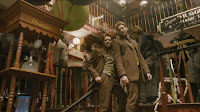Harry Potter is all about Harry. He's our hero. He's the Boy Who Lived who is prophesied to defeat He Who Should Not be Named. So everything that happens in a Harry Potter book should be all about him, should in some way contribute directly to his hero's journey...right?
And yet, in Rowling's world, many of her characters, aside from her hero, have compelling goals and journeys of their own that only indirectly affect Harry's.
Fred and George's business ventures are a good example. There are points when their goals and Harry's intersect, such as when Harry gives them his Tri-Wizard gold as starter capital, or when they show Harry some of their dark arts defense products -- which Draco later uses against Harry and the Order. But by and large, the twins' joke shop and Harry's quest to end Voldemort are two separate journeys.
In Chamber of Secrets, Filch tries to use Kwikspell to improve his magical abilities. Lockhart gives advice to Hagrid on how to keep kelpies out of a well. Percy snogs Penelope in secret. And in Half-Blood Prince, Mrs. Weasley comforts Tonks on her relationship woes with Lupin.
While elements of these actions provide clues or serve as a foil for Harry's own journey, they also show the rich lives going on beyond Harry's own aims and control. In other words, JKR's characters seem so real to us partly because they not only have their own aims and problems, but they also interact with each other without Harry as center.
Of course, Ron and Hermione, being the two primary secondaries, have the most going on. Here's a great example from Order of the Phoenix of Hermione pursuing her own goals and interacting with Ron where Harry is merely an observer:
'They're hats for house-elves,' she said briskly now stuffing her books back into her bag. 'I did them over the summer. I'm a really slow knitter without magic but now I'm back at school I should be able to make lots more.'While Hermione's quest to free the house-elves resonates to some of Rowling's deepest themes, here, the interaction between Hermione and Ron speaks more to their opposing personalities and developing relationship than it does to Harry's need to understand his role in freeing the wizarding world.
'You're leaving out hats for the house-elves?' said Ron slowly. 'And you're covering them up with rubbish first?'
'Yes,' said Hermione defiantly, swinging her bag on to her back.
'That's not on,' said Ron angrily. 'You're trying to trick them into picking up the hats. You're setting them free when they might not want to be free.'
'Of course they want to be free!' said Hermione at once, though her face was turning pink. 'Don't you dare touch those hats, Ron!'
She turned on her heel and left. Ron waited until she had disappeared through the door to the girls' dormitories, then cleared the rubbish off the woolly hats.
'They should at least see what they're picking up,' he said firmly.
Creating our secondaries with the same passion and eye to detail as we do our heroes and heroines makes for a truly engaging read. However, for most of us, we will not have the ample word count that Rowling's status and the length of her series provided. Still, a few words can pack a powerful punch if chosen wisely.
How much care have you put into creating your secondary characters? Have you envisioned ways in which your secondaries can interact with each other that don't revolve around your hero? Do they have full lives, goals, and problems of their own that they must struggle with as well? And how can you sneak all this onto your page while keeping the forward thrust of your story firmly focused on your hero?
I'd love to hear examples of what you've done with your secondaries!
Also, please join me tomorrow when we have a special guest. Fabulous debut fantasy author Michael L. Martin, Jr. will be here to discuss "A Sense of Wonder" in reading Harry Potter and writing our own stories. I absolutely love his book and can't wait to share it with you!

